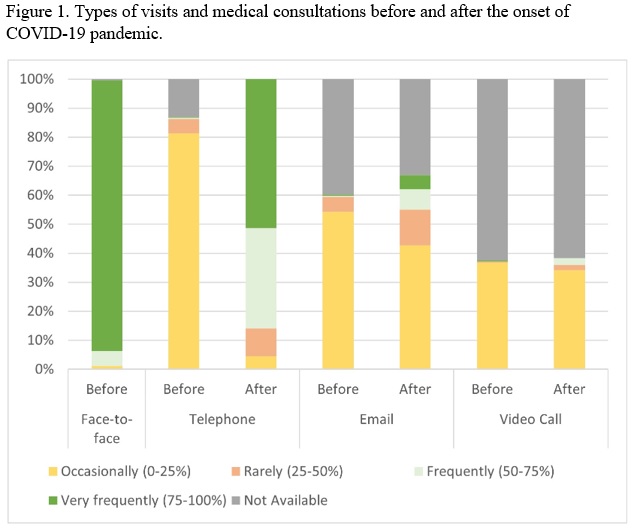P638 Changes in the management of IBD patients since the onset of COVID-19 pandemic. A path towards the implementation of telemedicine in Spain?
Del Hoyo Francisco, J.(1);Millán, M.(2);Garrido-Marín, A.(1);Nos, P.(1);Barreiro-de Acosta, M.(3);Bujanda, L.(4);de la Portilla, F.(5);Aguas, M.(1);
(1)Hospital La Fe, Department of Gastroenterology, Valencia, Spain;(2)Hospital La Fe, Coloproctology Unit- Department of Surgery, Valencia, Spain;(3)Complexo Hospitalario Universitario de Santiago, Department of Gastroenterology, Santiago de Compostela- A Coruña, Spain;(4)Hospital Donostia/Instituto Biodonostia- Universidad del País Vasco UPV/EHU, Department of Gastroenterology, San Sebastián, Spain;(5)Virgen del Rocio University Hospital, Coloproctology Unit- Gastrointestinal Surgery Department-, Sevilla, Spain
Background
COVID-19 pandemic increased medical services demand aside from interrupting daily clinical practice for other diseases such as Inflammatory Bowel Disease (IBD). Here we present the results of a survey to gain the perception of IBD specialists in their patient-management using telemedicine in their daily practice.
Methods
This was an observational survey study among physicians focused on IBD (gastroenterologist, surgeons, and pediatricians) members of the Spanish Working Group on Crohn's Disease and Ulcerative Colitis (GETECCU), the Spanish Association of Gastroenterology (AEG), and the Spanish Association of Coloproctology (AECP), regarding changes of management of IBD patients.
Results
We received a total of 269 responses to the survey (from May to June 2020). Before the pandemic, nearly all the respondents reported performing very frequently their visits face-to-face (n=251, 93.3%) while, during the pandemic, the telephone visits were the most frequent visits performed (n=138, 51,3%). Regarding communication difficulties, 157 (58.4%) respondents reported the impossibility of performing a proper examination as the most relevant issue. Also, 114 (42.4%) respondents considered remote visits more time-consuming than face-to-face visits. Most gastroenterologists (n=188, 83.2%) considered patients with active perianal disease in special need of face-to-face consultation and more than half of the surgeons (n=35, 50.7%) reported having performed an immediate postoperative follow-up remotely.
Conclusion
Most IBD units have implemented remote visits during the pandemic, but most professionals found them more time-consuming and unsuitable for some disease profiles. Therefore, there is a need for the development of better telemedicine systems that can meet professionals’ and patients´ requirements.


